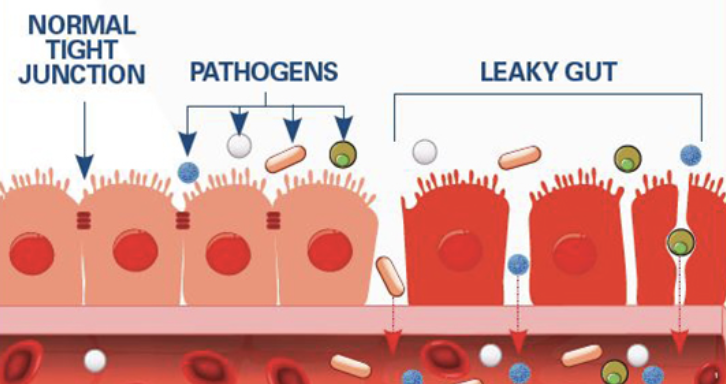Is Leaky Gut Real?

A client sent me this message: I just came back from a talk about allergies… the doctor said “there’s no such thing as leaky gut. It’s just a term used by naturopaths to try and sell you something.”
Leaky gut or “intestinal hyper-permeability” is very real and there are numerous studies connecting leaky gut with multiple chronic diseases like celiac, Crohn’s, Type 1 diabetes, and IBS to name a few.
So what is leaky gut exactly?
Imagine a wooden picket fence.
A fence normally has small gaps in between each plank of wood, right? In the GI tract, these are called “tight junctions”.
With leaky gut however, the fence has missing planks of wood creating larger gaps between the planks allowing potential trespassers to get through.
The digestive system is not only where we digest and absorb food; the intestinal wall also protects us by acting as a barrier, controlling what enters into the bloodstream while blocking the passage of harmful substances, like bacteria and toxins.
Small gaps or “tight junctions” allow water and nutrients to pass through.
When the tight junctions of the intestinal walls become loose, bacteria, toxins, and undigested food particles can enter the bloodstream and cause the immune system to freak out. Not good!
Scroll left to see great imagery of “tight junctions” vs. “leaky gut” and how it can lead to systemic inflammation.
What causes leaky gut? LOTS!
✔️Excessive sugar intake
✔️Non-steroidal anti-inflammatory drugs (think Ibuprofen, Tylenol) & prescription meds
✔️Excessive alcohol intake
✔️Nutrient deficiencies. Vitamin D is critical.
✔️Chronic inflammation throughout the body – a vicious cycle!
✔️Dysbiosis. Yeast, bacterial, and parasitic overgrowths in the gut can affect barrier function.
✔️Stress!
✔️Gluten

Now let’s look at how that happens, testing & common warning signs.
“Zonulin” – a protein in the human gut – controls the size of the gaps in your “fence”. The more zonulin you have, the larger the gaps, the higher the chance of leaky gut.
Gluten – the protein in grains especially wheat – is a major culprit by increasing the release of zonulin in everyone! I mean eeeevryyoooone!
Gut infections like parasites, fungus, and bacterial overgrowths can also increase zonulin so getting a comprehensive stool test is often warranted if you present with symptoms of leaky gut. Zonulin can also be measured.
While no testing is fully accurate, an IgG food sensitivity test can also help indicate the presence of leaky gut based on the number of food sensitivities you have; especially if you are highly sensitive to the foods you consume most!
Checking for vitamin & mineral deficiencies is another way to validate leaky gut because nutrient malabsorption is one of the common warning signs.
Think of the gut lining as a big fluffy plush carpet that can easily absorb liquids and foods that fall into it. When the plush carpet becomes damaged and run down, food and liquid can no longer get absorbed.
Finally, check your vitamin D. It is recommended to have at least 50-70ng/ml since vitamin D helps increase tight junctions and healing.
What are other signs & symptoms?
✔️Digestive issues like bloating, gas, diarrhea, IBS
✔️Allergies or asthma
✔️Joint and muscle pain
✔️Autoimmune conditions like Hashimoto’s, celiac, rheumatoid arthritis, lupus, vitiligo
✔️Skin issues like acne, rosacea, eczema
✔️Mood issues like depression and anxiety
Please keep in mind that leaky gut is not a disease; it’s a symptom and one that I address using the ‘3 R’ strategy; Remove, Replenish & Repair.
Checkout my article on gut healing for more information on how to support the intestinal lining of your gastrointestinal tract.
As always, I’d love to hear from you. If you have any comments or questions, please feel free to leave them below.

